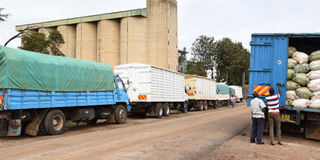Farmers fear losses as traders allowed to import maize

Maize is delivered to the National Cereals and Produce Board’s depot in Eldoret on April 16, 2018. PHOTO | FILE | NATION MEDIA GROUP
What you need to know:
- According to farmers, most of the traders who delivered maize to NCPB have received payments at their expense.
- DP Ruto admitted that middlemen have made it difficult for the government to adequately address the farmers’ plight.
- Moiben MP Silas Tiren has demanded that a list of those who import maize at the expense of local farmers be tabled in Parliament.
Maize farmers in the Rift Valley and western Kenya are staring at losses after the government allowed millers to import cheaper grains from neighbouring countries.
Prices for a 90kg bag of maize have this week dropped to Sh1,500 from Sh3,200 after the National Cereals and Produce Board (NCPB) stopped buying because all its stores in the region are full.
Farmers, who still have stock, claimed most of the maize at the NCPB depots was imported by cartels.
IMPORT
The grain supply improved in recent days with millers being allowed to import 6.6 million bags from neighbouring Uganda and Tanzania at Sh2,050 per bag.
In the market, the maize from Uganda is selling at Sh1,800 per bag.
Some cartels imported this maize and sold to NCPB while local farmers were still harvesting their crop.
“We are operating in a liberalised market economy and there is nothing wrong with doing business under the East Africa Common Market protocol,” a trader in Eldoret who requested not to be named said.
ARMYWORM
According to farmers, most of the traders who delivered maize to NCPB have received payments at their expense.
The farmers are owed Sh5 billion for maize deliveries to the board.
“The cartels took advantage of a loophole in the vetting process to deliver the maize undetected,” Leng’use Farmers Cooperative Society chairman Stephen Gathuo said.
NCPB has also admitted that most of its stores in western Kenya are full yet farmers still have stocks.
“There is no way NCPB stores in areas which are not maize growing can be full yet the yield was expected to be low this season due to armyworm invasion and drought,” Mr Kipkorir Menjo, the Kenya Farmers Association director, said.
CARTELS
This week, Deputy President William Ruto admitted that middlemen have made it difficult for the government to adequately address the farmers’ plight.
“It has become difficult for the government to differentiate between middlemen and genuine farmers when they take their maize to NCPB depots," Mr Ruto said.
The government, he added, had put in place stringent measures to stamp out middlemen enriching themselves at the expense of maize farmers.
“We will not allow unscrupulous businessmen to take advantage of our farmers. We will not use taxpayers’ money to pay brokers,” he warned while in Elgeyo-Marakwet County.
But the imports mean that Kenyans, mostly the consumers in urban areas, are set to pay less for maize flour.
However, farmers on Thursday said the drop in prices means they will be unable to access capital to purchase farm input for this season’s crop.
MAIZE FLOUR
They said millers were reluctant to buy their maize due to flooding of the imported produce in the market.
NCPB also plans to release more than 600,000 bags from the strategic grain reserve at Sh2,300 a bag, which is expected to result in lower maize flour prices in retail outlets.
The price of a 2kg packet of maize flour rose to Sh150 last year, following a shortage, forcing the government to intervene through a subsidy programme that lowered the cost to Sh90.
The programme ended last December and the price increased to Sh115.
A packet of Soko flour is going for Sh100, Pembe at Sh100 and Jogoo at Sh101, having dropped by an average of Sh5.
But even with increased imports and local stocks, some experts say the country may run out of the staple food by mid this year.
PRODUCTION
Kenya consumes about three million bags of maize a month. In 2016, farmers produced about 30 million bags.
This reduced by five million bags in 2017 because of drought and pest infestation.
The experts say the government may be forced to either import maize or reintroduce the subsidy programme by mid this year to cover for a shortfall of about five million bags.
“Food shortage is unavoidable due to declined production this season caused by erratic climatic conditions during the planting season and middlemen with enormous stocks stand to be the major beneficiaries,” Mr Jackson Kosgey from Moiben, Uasin Gishu County, said.
Mr Ruto explained that last year farmers supplied more maize to the NCPB depots than had been anticipated.
The board received at least one million bags of maize, which consumed a budget of Sh3.5 billion, but the supplies increased this year to 3.5 million bags, gulping Sh7.1 billion so far.
DISCLOSE
Moiben MP Silas Tiren has demanded that a list of those who import maize at the expense of local farmers be tabled in Parliament.
“Some leaders claim that some farmers are colluding with brokers.
"There is no maize which comes into the country without passing through the border and the government knows every lorry that brings the grains.
"We want this list to be made public so that every Kenyan knows who is hurting our farmers,” Mr Tiren said on Tuesday at a function in his constituency.
A list of farmers who have received subsidised fertiliser from NCPB should also be tabled in Parliament, he said.
“There are brokers also involved in the purchase and sale of fertiliser,” the MP said.





